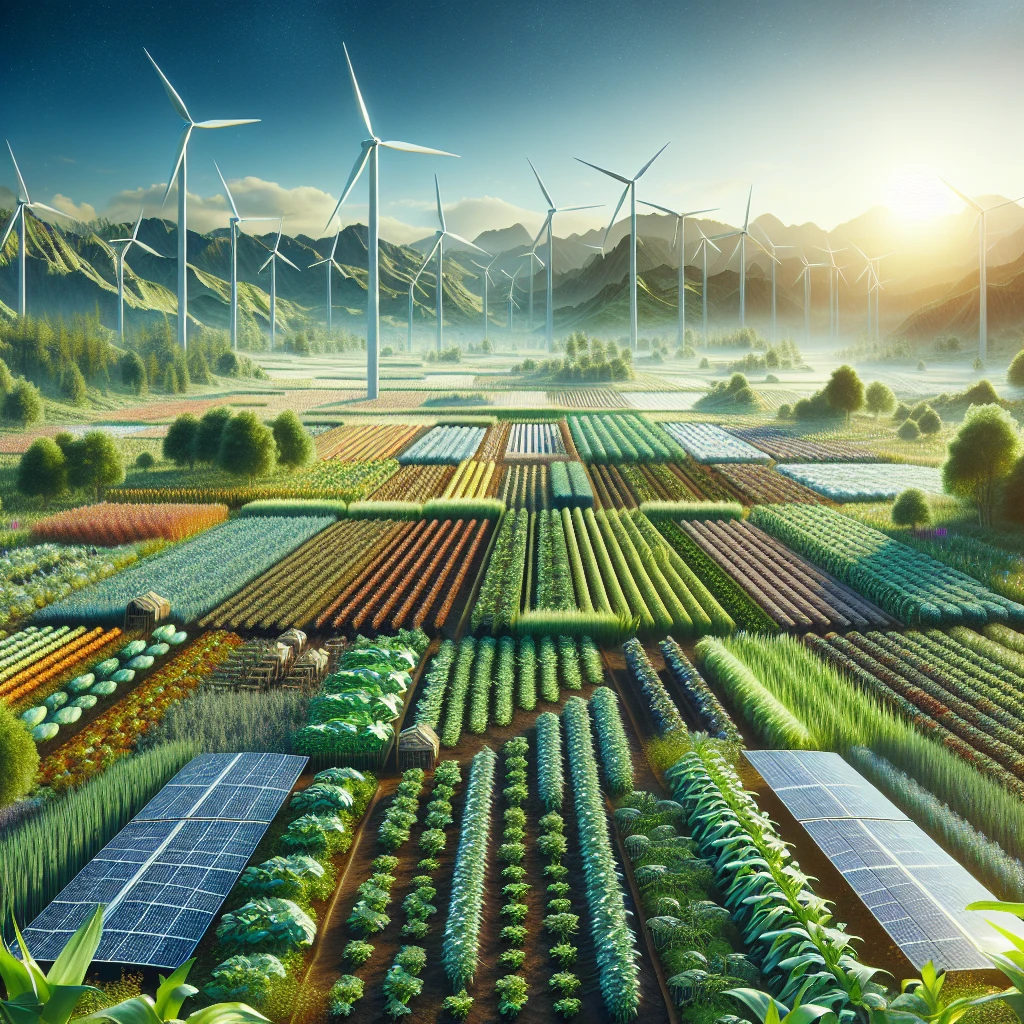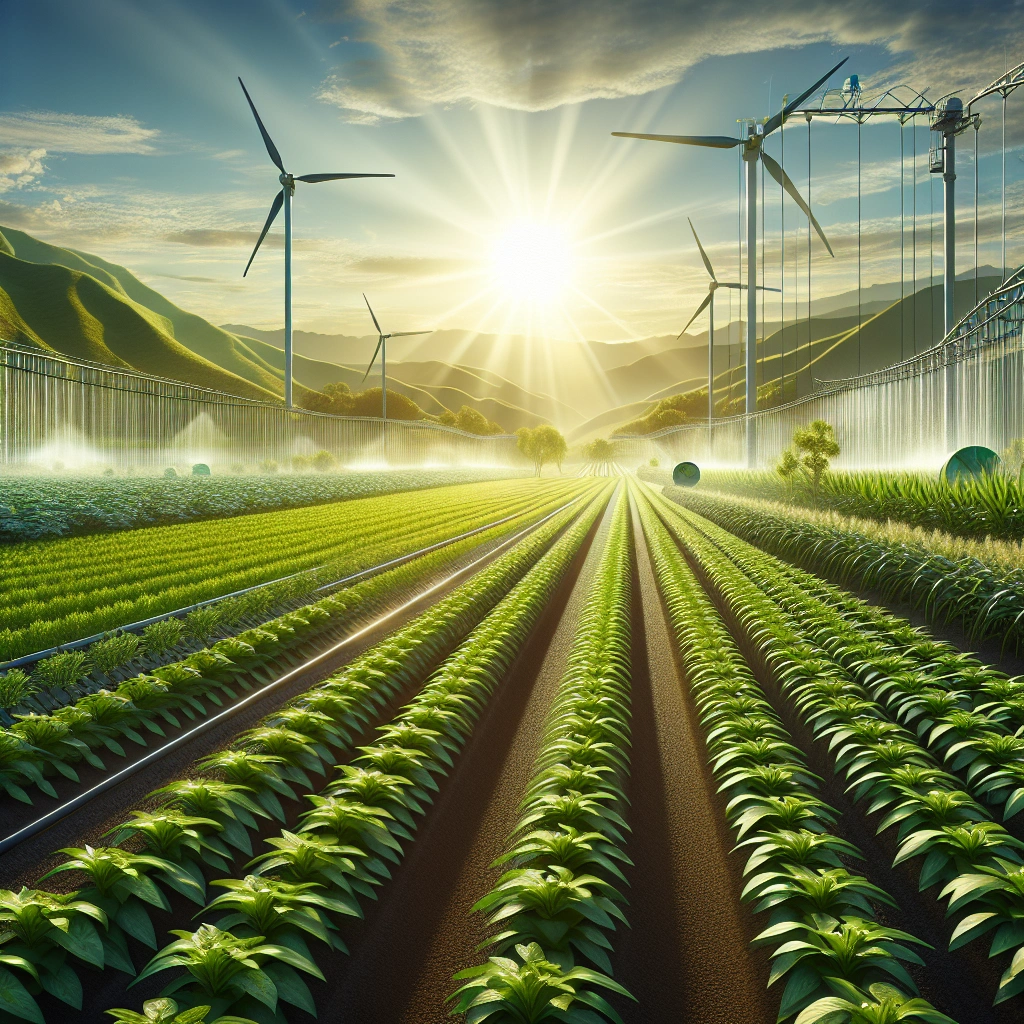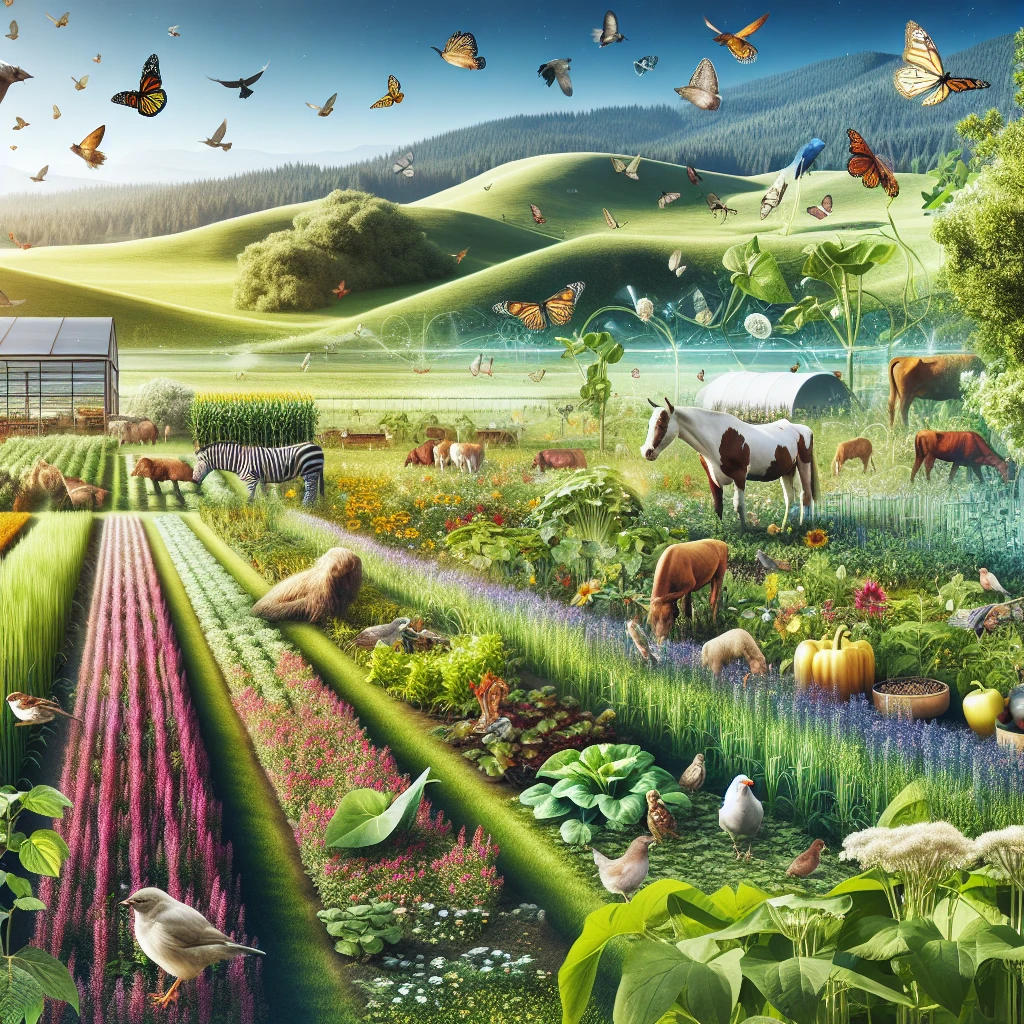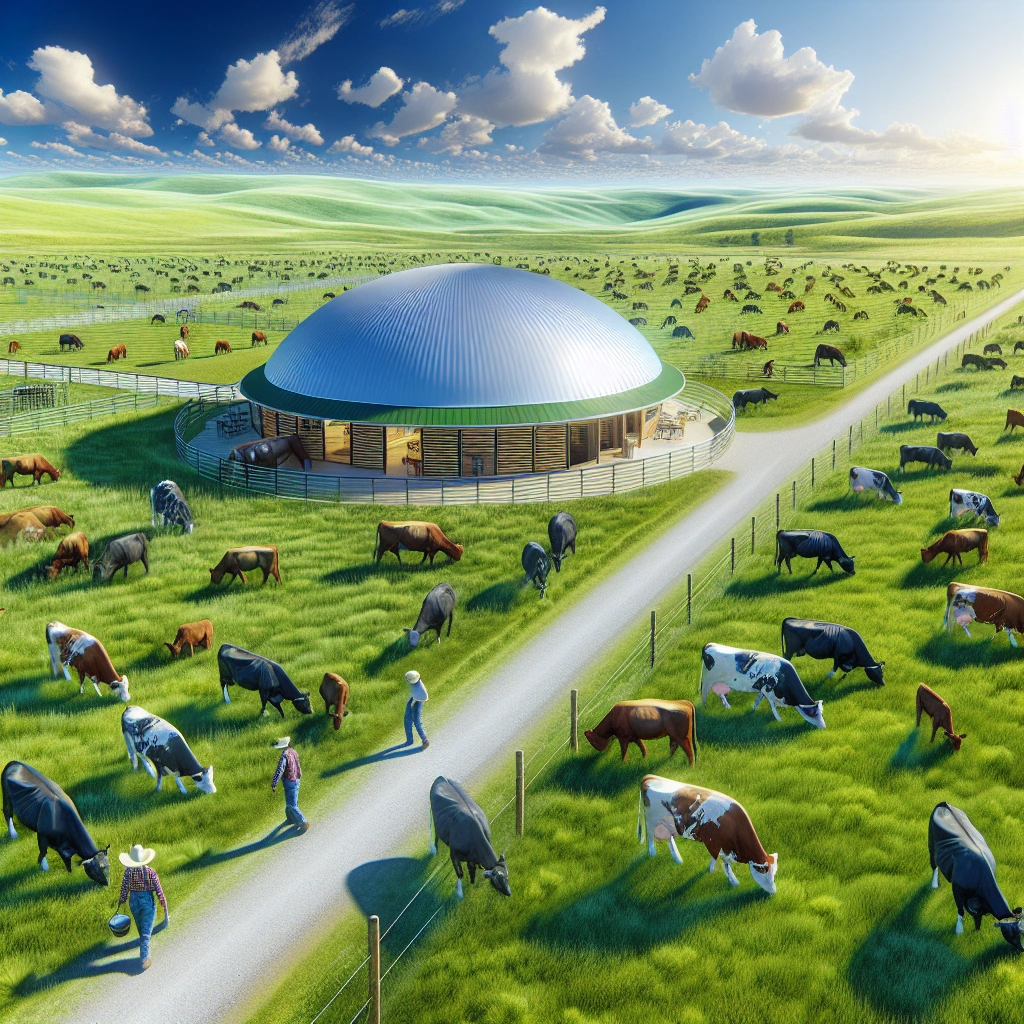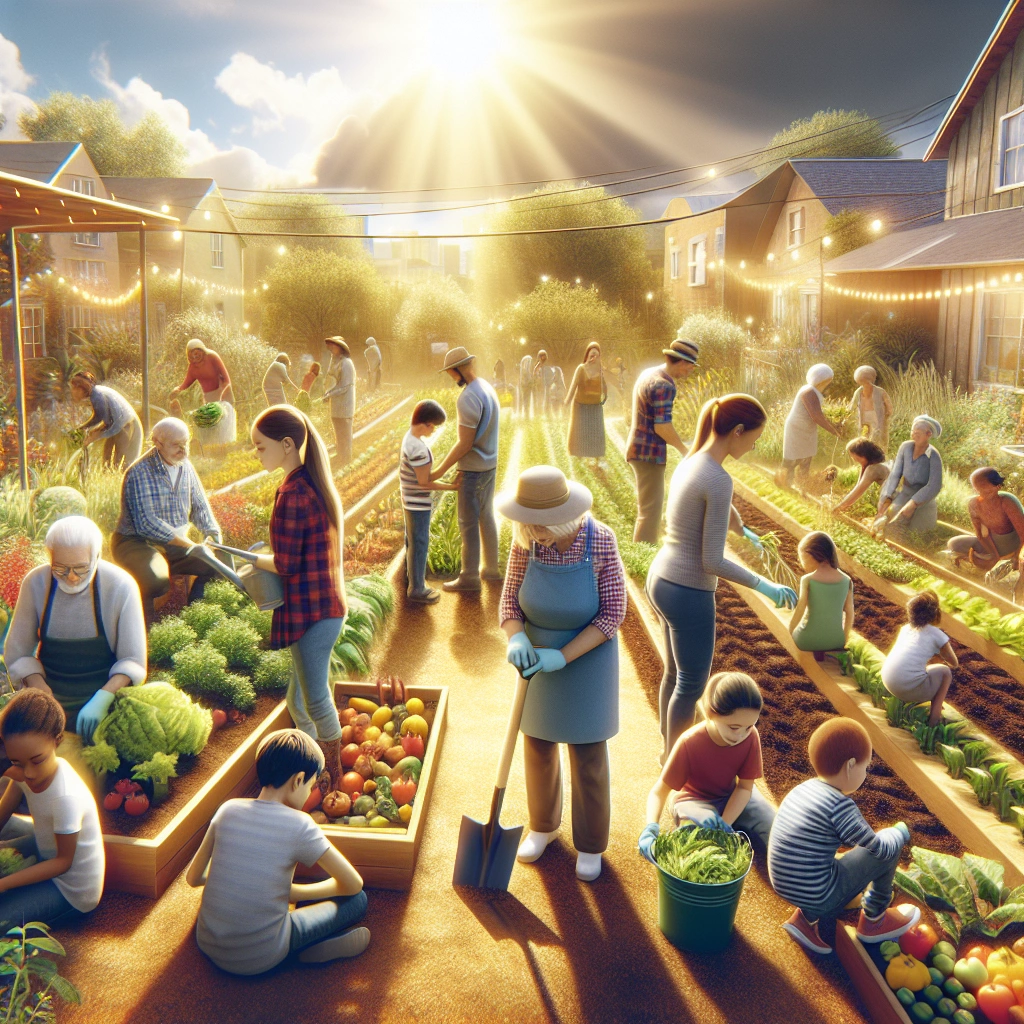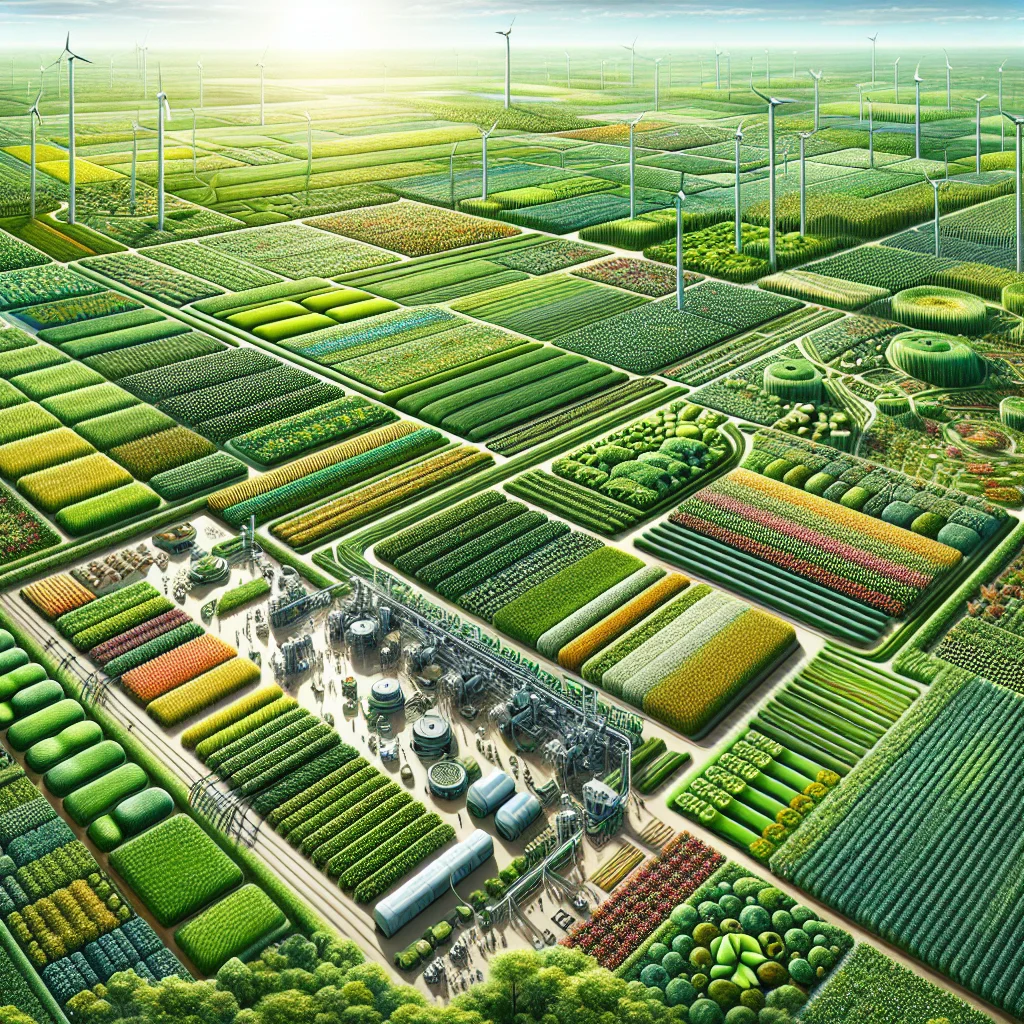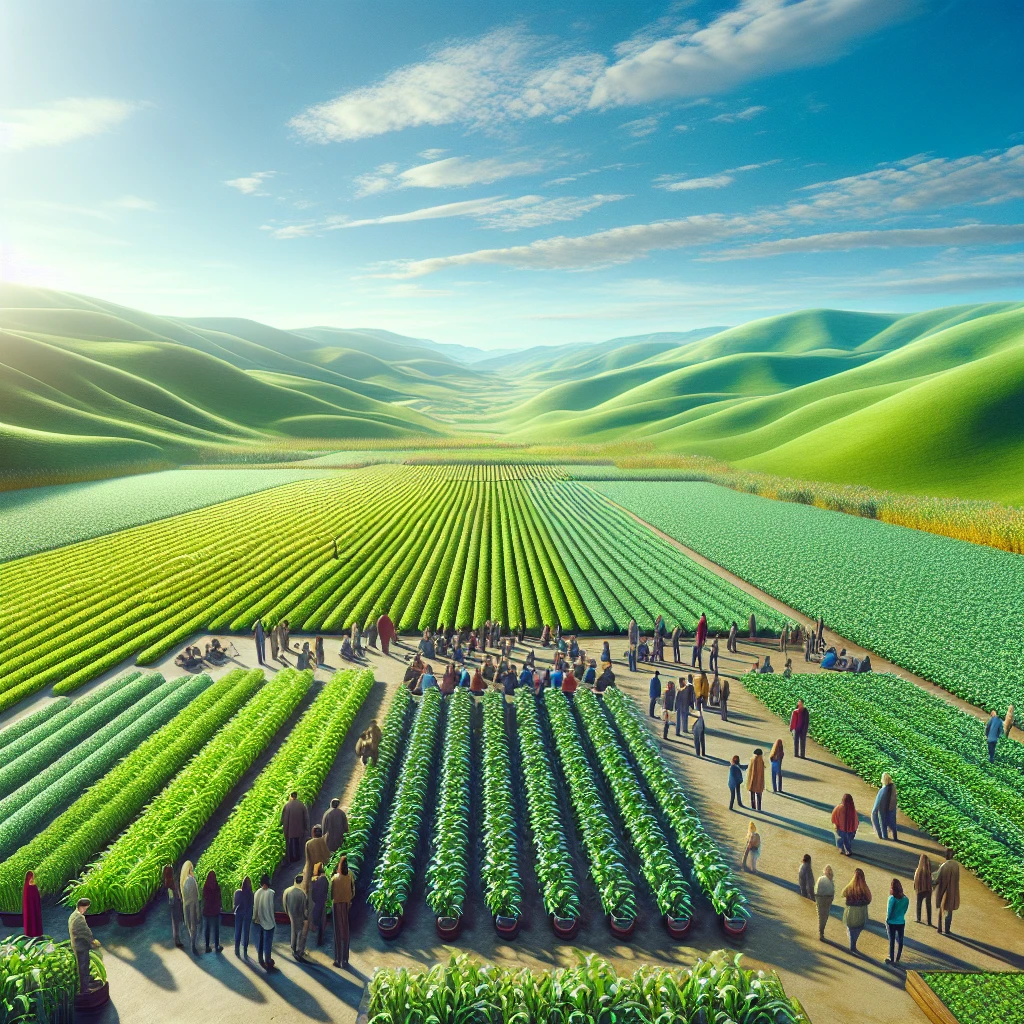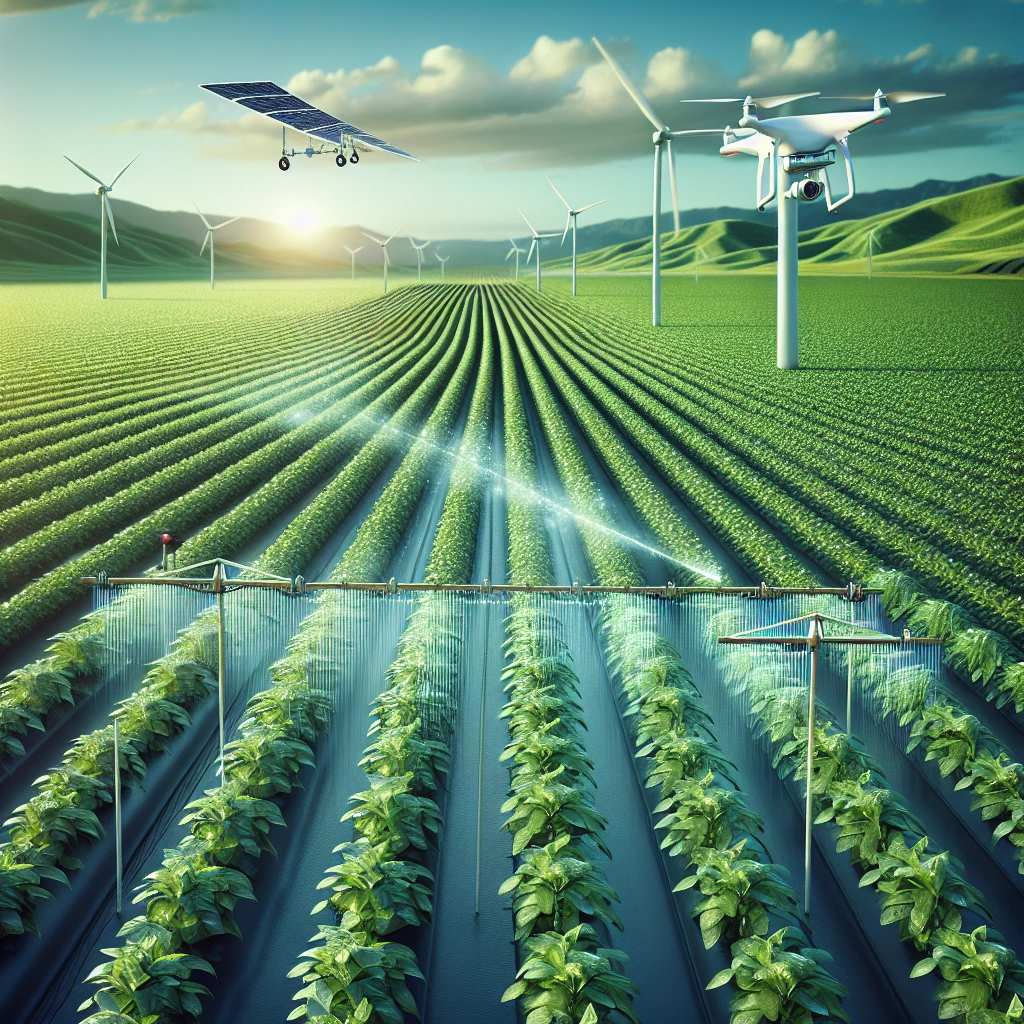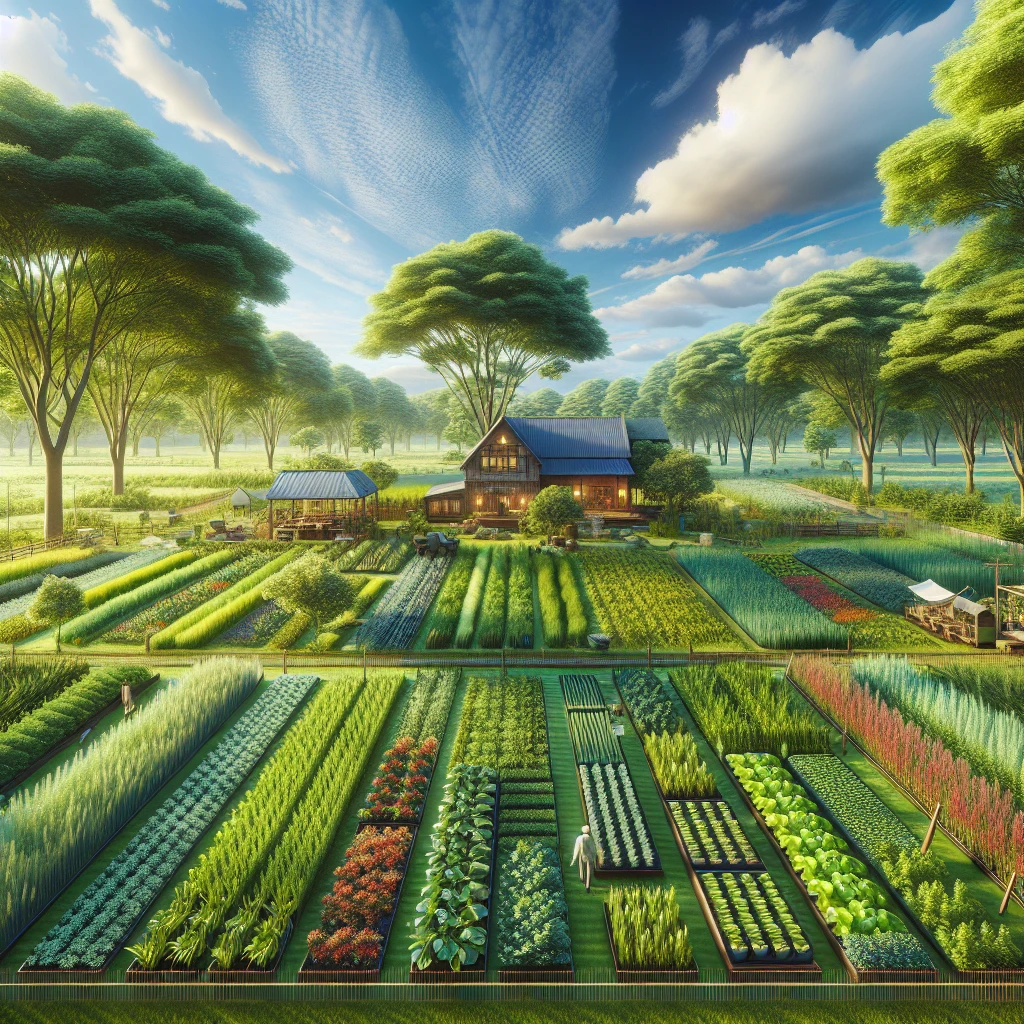
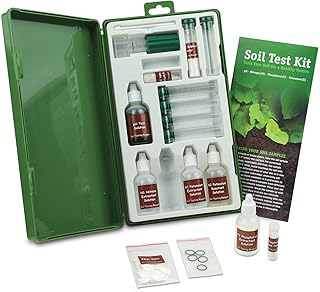
Sustainable agriculture involves using techniques that respect the environment, biodiversity, and the earth’s natural waste absorption capacity. It aims to provide resources for current human populations while conserving the planet’s ability to sustain future generations.
Sustainable agriculture practices include rotating crops, embracing diversity, planting cover crops and perennials, and reducing or eliminating the use of harmful chemicals.
This article will cover the definition of sustainable agriculture, its importance, and the principles and techniques involved in sustainable agriculture practices.
Check out this Youtube video: Gain valuable insights and knowledge on sustainable agriculture practices by watching this informative APES Video Notes 5.15 – Sustainable Agriculture video on YouTube!
The History of Sustainable Agriculture
Ancient agricultural practices and sustainability
The history of sustainable agriculture dates back to ancient times when civilizations practiced methods such as crop rotation, terracing, and agroforestry to maintain soil fertility and prevent erosion. For example, the ancient Maya utilized sustainable practices like crop terraces and reservoirs to improve agricultural productivity while minimizing soil erosion.
These ancient agricultural methods serve as valuable models for modern sustainable farming, emphasizing the importance of holistic approaches to land management and resource utilization.
The Green Revolution and its impact on sustainability
The Green Revolution, characterized by the adoption of high-yielding crop varieties, modern irrigation systems, and chemical inputs, significantly increased agricultural productivity. However, the reliance on inorganic fertilizers and pesticides led to environmental degradation and negative health consequences.
While the Green Revolution addressed immediate food security needs, its long-term impacts highlighted the importance of transitioning towards more sustainable and environmentally friendly agricultural practices.
| Ancient Practices | Impact of Green Revolution |
|---|---|
| Crop rotation | Increased productivity |
| Terracing | Environmental degradation |
| Agroforestry | Health consequences |
Ancient sustainable agricultural practices paved the way for modern-day efforts to balance productivity with environmental preservation, while the Green Revolution showcased the need for sustainable innovations in farming to ensure long-term food security and ecological health.
The Principles of Sustainable Agriculture
Key principles and practices
Sustainable agriculture revolves around implementing farming practices that prioritize environmental stewardship, economic viability, and social responsibility. This entails maximizing land use efficiency, minimizing chemical inputs, and promoting biodiversity.
Key principles involve crop rotation, organic fertilizers, integrated pest management, and conservation tillage. These practices aim to maintain soil health, minimize environmental impact, and ensure the long-term productivity of agricultural systems.
Importance of biodiversity in sustainable agriculture
Biodiversity plays a pivotal role in sustainable agriculture by fostering healthy ecosystems, enhancing soil fertility, and promoting natural pest control. A diverse range of plant and animal species within an agricultural environment not only supports pollination and crop resilience but also contributes to the preservation of genetic diversity, essential for ensuring resistance to diseases and environmental fluctuations.
Furthermore, agricultural biodiversity strengthens food security by expanding the variety of foods available while safeguarding against potential threats to monoculture.
| Benefits of Biodiversity in Sustainable Agriculture |
|---|
| Enhanced soil fertility and nutrient cycling |
| Natural pest control and pollination support |
| Preservation of genetic diversity for crop resilience |
| Expansion of food variety for improved food security |
The Role of Soil Health
Importance of soil health in sustainable agriculture
Healthy soil is vital for sustainable agriculture as it supports plant growth, increases water availability, and reduces the impact of pollutants. It also plays a key role in nutrient cycling, promoting plant resilience and productivity.
Techniques for preserving and improving soil health
Several techniques can be employed to preserve and improve soil health, including cover cropping, conservation tillage, crop rotation, organic mulching, and leaving plant residue. Additionally, managing soil pH, minimizing inversion tillage, and controlling fertilization are crucial in maintaining soil health and agricultural sustainability.
| Main Soil Conservation Methods |
|---|
| 1. Practice sustainable operations |
| 2. Crop rotation |
| 3. Practice mulching |
| 4. Plant cover crops |
| 5. Contour plowing |
| 6. Cross slope farming |
| 7. Organic growing |
| 8. Conservation tillage |
Soil health is a fundamental aspect of sustainable agriculture, and implementing these techniques is essential to ensure the continued productivity and resilience of our agricultural lands.
Sustainable Agriculture and Water Management
Efficient water usage in agriculture
Efficient water usage in agriculture is crucial for sustainable farming practices. One effective method is the adoption of pressurized irrigation systems, which minimize water loss to evaporation, deep percolation, and field runoff.
Additionally, advancements in irrigation systems, such as drip irrigation, have proven to significantly enhance water-use efficiency. For instance, drip irrigation provides a water-use efficiency of over 95%, resulting in a reduction of water usage by more than 40% compared to traditional flooding methods (Bayer Global).
Strategies for sustainable water management
Strategies for sustainable water management in agriculture encompass various practices aimed at optimizing water usage and preserving ecosystems. These include soil management, efficient irrigation techniques, and the implementation of drought-tolerant crop varieties.
By leading excess water away from fields and slowing down water flow, farmers can mitigate the adverse effects of excessive water, such as soil erosion and nutrient runoff. Embracing smart methods and technologies in agriculture, such as drought-tolerant crop planting and crop rotation, is vital for promoting sustainable water usage while minimizing the impact of drought on plant growth and yields (The Nature Conservancy).
Biodiversity and Sustainable Agriculture
The role of biodiversity in sustainable farming
Biodiversity plays a crucial role in sustainable farming by enhancing the resilience of ecosystems and agricultural systems. Diverse plant and animal species help maintain soil fertility, support natural pollination, and aid in pest control, contributing to the overall health and productivity of agricultural landscapes.
Additionally, diverse ecosystems are better equipped to withstand environmental challenges such as climate change, ensuring the long-term sustainability of farming practices.
Examples of how biodiversity promotes sustainability
One compelling example of how biodiversity promotes sustainability is through agroecological approaches that utilize diverse cropping systems and integrated pest management. By promoting biodiversity, farmers can reduce the reliance on chemical inputs, enhance soil health, and improve overall agricultural productivity.
Another example is seen in the practice of intentional crop rotation, which not only diversifies plant species within agricultural systems but also fosters increased biodiversity, contributing to a more sustainable and resilient farming environment.
| Biodiversity-promoting Practice | Sustainability Benefits |
|---|---|
| Agroecological approaches | Reduced chemical inputs, improved soil health |
| Intentional crop rotation | Enhanced biodiversity, increased agricultural resilience |
Biodiversity plays a vital role in sustainable agriculture by bolstering ecosystem resilience and enhancing the overall productivity and sustainability of farming practices. Embracing and promoting biodiversity in agriculture is essential for ensuring the long-term health and prosperity of agricultural landscapes.
Sustainable Pest Control Methods
Sustainable pest control methods encompass a range of natural techniques that minimize the use of chemical pesticides, focusing on non-toxic and organic ingredients to manage infestations. These techniques include the use of dichotomous earth and neem oil, which are effective against minor nuisance pests when applied as DIY prevention measures.
However, it’s important to note that these methods may not be as effective for addressing full-blown infestations. Natural pest control techniques often involve leveraging materials and methods found in nature, including using plants to repel pests or introducing predators to eat the pests, thereby reducing reliance on chemical pesticides while maintaining effective pest management.
Reducing chemical pesticide usage holds immense importance in sustainable agriculture. By minimizing the reliance on chemical pesticides, the negative impacts on the environment can be significantly reduced.
Pesticides carried into water bodies through surface runoff and leaching can contaminate water, posing risks to both the environment and public health. Moreover, high levels of pesticide use contribute to environmental degradation and harm farmers.
Therefore, by embracing natural pest control techniques and reducing chemical pesticide usage, agricultural practices can align better with sustainable and eco-friendly approaches.
| Natural Pest Control Techniques | Importance of Reducing Chemical Pesticide Usage |
|---|---|
| – Use of organic ingredients such as dichotomous earth and neem oil | – Minimizing negative environmental impacts from pesticide use |
| – Leveraging materials found in nature to control pests | – Reducing water contamination due to pesticide runoff and leaching |
| – Embracing predator-prey relationships for pest management | – Addressing environmental degradation caused by high pesticide usage |
Sustainable pest control methods emphasize the integration of natural techniques to manage pest infestations while striving to reduce the reliance on chemical pesticides. It’s crucial for agricultural practices to shift towards these methods to minimize environmental impacts and promote eco-friendly pest management.
All in all, the focus on natural pest control techniques and the importance of reducing chemical pesticide usage are key pillars of sustainable agriculture notes.
Sustainable Agriculture and Climate Change
Impact of climate change on agriculture
Climate change has a substantial impact on agriculture, posing significant challenges to crop growth and livestock health. The increasing frequency of extreme weather events, including floods and droughts, negatively affects crop yields and soil quality.
Additionally, rising temperatures and changing precipitation patterns can disrupt the traditional growing seasons for various crops, thereby disrupting agricultural productivity.
Practices for mitigating the effects of climate change on farming
To mitigate the adverse effects of climate change on farming, sustainable agricultural practices play a crucial role. Measures such as organic soil management, including the use of cover crops, mulching, and reduced tillage methods, contribute to improved soil health and carbon sequestration.
Furthermore, implementing diversified crop rotations, conservation tillage, and integrating livestock into crop production systems has shown promising potential for reversing the impact of climate change on agriculture.
It is essential for the agricultural sector to adopt these sustainable practices to build resilience against the challenges posed by climate change. By prioritizing environmentally-friendly farming methods, we can safeguard agricultural productivity and ensure long-term food security while minimizing the industry’s carbon footprint.
| Sustainable Practices for Mitigating Climate Change Effects |
|---|
| 1. Organic soil management, including cover crops and reduced tillage |
| 2. Diversified crop rotations and conservation tillage |
| 3. Integration of livestock into crop production systems |
Sustainable Livestock Farming
Sustainable livestock practices play a crucial role in reducing environmental degradation, public health risks, and improving animal welfare. Livestock farming contributes to long-term cost savings by decreasing the reliance on chemical inputs and expensive machinery, leading to a more sustainable and efficient system.
Benefits of sustainable livestock practices
Implementing sustainable livestock practices helps to reduce negative environmental impacts such as deforestation, soil erosion, and water pollution caused by traditional farming methods. Additionally, livestock farming contributes significantly to food security, nutrition, poverty alleviation, and economic growth.
For example, manure serves as a vital natural fertilizer, and livestock used as draft animals enhance productivity in regions with limited mechanization. Sustainable livestock systems are essential assets for vulnerable communities, supporting the livelihoods and food security of millions of people.
Challenges and solutions for sustainable animal husbandry
While sustainable livestock farming offers numerous benefits, it is not without its challenges. Some of the key challenges include uncertainties in demand, global climate change, environmental impacts, social and regulatory issues, and changing consumer preferences.
However, sustainable animal husbandry addresses these challenges by embracing techniques like integrated pest management, organic farming, and humane animal handling. As farms strive to become more sustainable, they are adopting practices to enhance production efficiency and minimize resource use.
Sustainable Agriculture and Food Security
Sustainable agriculture and food security are deeply intertwined. By implementing sustainable agricultural practices such as conservation tillage, crop rotation, and alternative food options, we can improve food security, conserve our resources, mitigate the impacts of climate change, and promote a healthy planet for future generations.
The relationship between sustainable agriculture and food security
The relationship between sustainable agriculture and food security is crucial for ensuring long-term food availability. Sustainable agriculture increases food availability by enhancing soil fertility, reducing soil erosion, and improving water management, leading to higher crop yields and increased food supply.
Examples of sustainable agriculture initiatives impacting food security
- Sustainable agriculture can help improve food security in several ways. For example, it increases agricultural productivity, enhances soil fertility, reduces soil erosion, and improves water management, leading to higher crop yields and increased food availability.
- Another example is the implementation of sustainable agricultural practices like conservation tillage, crop rotation, and the promotion of alternative food options, all contributing to greater food security.
| Initiative | Impact on Food Security |
|---|---|
| Crop rotation and sustainable irrigation | Increases crop yields, ensuring a steady food supply |
| Adoption of conservation tillage | Reduces soil erosion, preserving fertile land for sustained agriculture |
The Economics of Sustainable Agriculture
The financial benefits of sustainable farming
Sustainable farming offers significant financial benefits by reducing the reliance on costly chemical inputs and machinery. By embracing natural methods, farmers can cut down on expenses related to purchasing chemical fertilizers, pesticides, and fuel for machinery.
This leads to long-term cost savings, contributing to improved profitability for farmers. Moreover, sustainable farming practices can align with consumer demand for organic produce, enabling farmers to fetch higher prices for their products and enhance financial returns.
Potential barriers to implementing sustainable agriculture practices
Despite the financial advantages, several barriers hinder the widespread adoption of sustainable agriculture practices. Financial barriers pose a major impediment, as the initial investments in transitioning to sustainable methods can be high.
Additionally, social barriers, such as land tenure issues and lack of infrastructure, create further obstacles. Agricultural intensification and the modernization of production also bring complexities in implementing sustainable methods.
Overcoming these barriers requires collaboration between farmers, financial institutions, and policymakers to provide the necessary support and resources for a smoother transition to sustainable farming practices.
Community Engagement in Sustainable Agriculture
Importance of community involvement in sustainable agriculture
Community involvement in sustainable agriculture is essential for fostering healthier, more environmentally friendly food systems. By engaging residents as “Citizen Farmers,” we can educate and empower individuals to give back to the land and ensure crop diversity, ultimately leading to increased food security within local communities.
Through sustainable agriculture practices, we can enrich the soil, reduce reliance on harmful chemicals, and promote a more sustainable food production system.
Collaborative efforts for promoting sustainability in farming communities
Multi-stakeholder partnerships involving governments, businesses, NGOs, and farmers are crucial for promoting sustainability in farming communities. These collaborative approaches aid in the adoption of new sustainable practices, reduce environmental impact, and ultimately improve farmers’ livelihoods.
Through collaboration, agricultural communities can experience economic, social, and ecological benefits, such as effectively managing natural resources and coordinating farming practices. Additionally, engaging with the local community through volunteer structures, sustainable food production, and efforts to improve health and access to food can further support collaborative sustainability in farming communities.
| Collaboration Tips for Sustainable Agriculture |
|---|
| 1. Identify common goals and values |
| 2. Participate in policy dialogue and advocacy |
| 3. Create a welcoming environment at the farm site |
| 4. Engage in local marketing and community participation |
Remember, when it comes to sustainable agriculture, the more hands on the field, the better!
Global Initiatives for Sustainable Agriculture
International organizations promoting sustainable agriculture
- Greenpeace: Known for its eco-protests, Greenpeace is a prominent advocate for sustainable agriculture, working to protect the environment and promote eco-friendly farming practices.
- Heifer International: Through providing animals and training in sustainable agriculture, Heifer International has empowered over 20.7 million families to achieve self-sufficiency and food security.
Successful case studies of sustainable agriculture around the world
Here are a few notable case studies showcasing successful sustainable agriculture initiatives:
– General Mills, US: Leading the future of agriculture with innovative practices that prioritize sustainability.
– Bec-Hellouin, France: Pioneering forest-gardens as a sustainable agriculture method, promoting biodiversity and eco-friendly farming.
Education and Training in Sustainable Agriculture
Importance of education for sustainable farming practices
- Education is crucial for sustainable farming practices as it empowers farmers with the knowledge and skills to implement environmentally friendly and economically viable methods.
- By understanding the latest advancements in agricultural science and sustainable practices, farmers can enhance their production while minimizing their environmental impact.
Available resources and programs for agricultural training
- Various programs such as the Sustainable Agriculture Research and Education (SARE) program and initiatives by the National Institute of Food and Agriculture (NIFA) provide farmers with grant funding for research and educational opportunities.
- The Sustainable Agriculture Education Association (SAEA) promotes the development of best teaching practices in sustainable agriculture education to equip both teachers and learners with the necessary skills and knowledge.
- Additionally, the Soil Advocate Training from Kiss the Ground offers valuable resources for regenerative agriculture, focusing on the relationship between soil, plants, climate, and animal integration.
Advancements in Sustainable Agriculture Technology
Innovative technologies for sustainable farming
The 21st century has ushered in a wave of innovative technologies, revolutionizing sustainable farming practices. Precision agriculture, for instance, engages near real-time observations and responses to enhance farming efficiency and minimize resource usage.
Artificial Intelligence (AI) integrates machine learning and data analytics to optimize crop management, automate tasks, and predict yield outcomes. Moreover, vertical farming employs controlled environments and hydroponic systems to cultivate crops vertically, conserving land and water resources while ensuring year-round production.
The role of automation and digital tools in sustainable agriculture
Automation and digital tools play a pivotal role in sustainable agriculture by addressing labor shortages and enhancing productivity. IoT and sensors enable real-time monitoring of produce, animal health, and environmental conditions, fostering efficient resource utilization.
Additionally, remote sensing and satellite technology provide invaluable insights into crop and soil conditions, empowering farmers to make informed decisions. Furthermore, 3D printers offer versatility in repairing machinery, creating prosthetics for animals, and optimizing resource utilization on farms.
| Innovative Technologies | Role in Sustainable Agriculture |
|---|---|
| Precision agriculture | Enhances farming efficiency and resource usage |
| Artificial Intelligence | Optimizes crop management and automates tasks |
| Vertical farming | Utilizes controlled environments and conserves resources |
| IoT and sensors | Enables real-time monitoring of produce and environmental conditions |
| Remote sensing | Provides insights into crop and soil conditions |
| 3D printers | Offers versatility in resource optimization on farms |
Legislation and Policy for Sustainable Agriculture
The government has taken significant initiatives to support sustainable agriculture, with programs aimed at promoting environmental stewardship, enhancing farm income, and ensuring the responsible use of natural resources. One such initiative is the National Institute of Food and Agriculture (NIFA), which provides research and extension funding, competitive grants, and professional development programs.
Additionally, government funding offers financial grants and loans to farmers to expand sustainable farming efforts. These initiatives demonstrate the government’s commitment to sustainable agricultural practices and the well-being of farming communities.
The impact of policy on sustainable farming practices is substantial, as it influences farm investments, structural change, natural resource use, and innovation in the agricultural sector. Sustainable agricultural operations and practices have positive effects on the environment, animals, and people, contributing to the preservation of critical habitats, watershed protection, and improved soil health.
However, it is crucial to note that unsustainable practices can have severe impacts on the environment and human well-being, highlighting the urgency for sustainable resource management.
| Government Initiatives | Impact of Policy |
|---|---|
| NIFA programs provide funding and support for research and extension | Policy influences farm investments and structural change |
| Government funding offers financial grants and loans for sustainable farming | Sustainable practices have positive impacts on the environment and human well-being |
Government initiatives and policies play a pivotal role in advancing sustainable agriculture, fostering environmental sustainability, and promoting the well-being of farming communities. These efforts reflect a commitment to responsible agricultural practices and the preservation of natural resources for future generations.
Recommended Amazon Products for Sustainable Agriculture Notes
Here’s a curated list of products that can help you in understanding and implementing sustainable agriculture practices with ease. These recommendations are based on relevance, customer reviews, and popularity.
Organic Soil Test Kit
This soil test kit allows you to quickly and easily test the pH and nutrient levels of your soil, helping you make informed decisions about fertilization and soil amendment needs. The kit comes with easy-to-follow instructions and provides accurate results, making it an essential tool for sustainable agriculture enthusiasts.
– Pros:
| Pros | Cons |
|---|---|
| Easy to use | Limited tests included |
| Provides accurate results | |
| Helps in making informed decisions |
- Cons:
Sustainable Agriculture Books Bundle
This bundle includes a collection of books that cover various aspects of sustainable agriculture, including principles, practices, and case studies. These books provide in-depth knowledge and practical insights into sustainable farming, making it a valuable resource for anyone looking to learn and implement sustainable agriculture methods.
– Pros:
| Pros | Cons |
|---|---|
| Comprehensive information | |
| Includes practical insights | |
| Covers a wide range of topics |
- Cons:
Compost Bin
A compost bin is essential for converting organic waste into nutrient-rich compost, which can then be used to improve soil health and fertility. This particular model is durable, easy to use, and promotes sustainable waste management practices, making it a valuable addition to any sustainable agriculture setup.
– Pros:
| Pros | Cons |
|---|---|
| Durable construction | |
| Easy to use and maintain | |
| Promotes sustainable waste management |
- Cons:
Rain Barrel
Collecting rainwater in a rain barrel is an effective way to conserve water and reduce reliance on traditional water sources for irrigation. This particular rain barrel is easy to install, durable, and provides a practical solution for sustainable water management in agricultural settings.
– Pros:
| Pros | Cons |
|---|---|
| Easy to install | |
| Durable construction | |
| Promotes water conservation |
- Cons:
LED Grow Light
For sustainable agriculture enthusiasts interested in indoor or urban farming, an LED grow light is essential for providing plants with adequate light for growth. This particular LED grow light is energy-efficient, adjustable, and provides the right light spectrum for optimal plant growth, making it a top choice for sustainable farming practices.
– Pros:
| Pros | Cons |
|---|---|
| Energy-efficient | |
| Adjustable light spectrum | |
| Promotes optimal plant growth |
- Cons:
Top Recommended Product for Sustainable Agriculture Notes
If you’re looking for the best solution to start your sustainable agriculture journey, we highly recommend the Organic Soil Test Kit (https://www.amazon.com/s?k=Organic+Soil+Test+Kit). This kit provides accurate soil testing results, helping you make informed decisions about soil management practices, thus promoting sustainable agriculture.


Ready to improve your sustainable agriculture knowledge and practices? Check out the Organic Soil Test Kit (https://www.amazon.com/s?k=Organic+Soil+Test+Kit) today for the best results!


Conclusion
Sustainable agriculture notes are vital for the future of farming and food production. By implementing sustainable practices, we can ensure the health of our environment, protect natural resources, and promote biodiversity.
Furthermore, promoting sustainability in agriculture is crucial for the well-being of future generations. It is imperative that we continue to support and invest in sustainable farming methods to address the challenges of climate change and food security.
It is up to each of us to take action and make a difference in promoting sustainable agriculture. Whether it’s through supporting local farmers, adopting sustainable gardening practices, or advocating for policy changes, we all play a role in building a more sustainable future for agriculture.

